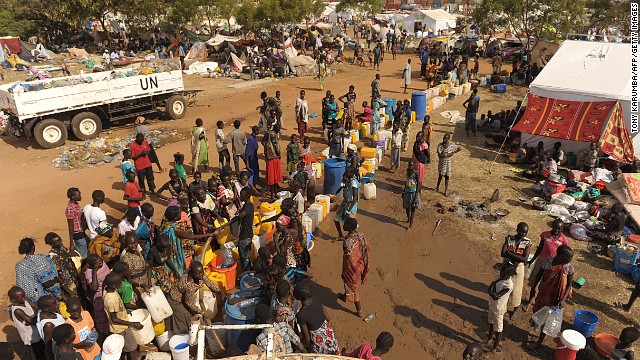Helicopters evacuate aid workers, other civilians from South Sudan

South Sudanese refugees line up for water at a United Nations compound in Juba on Saturday.
STORY HIGHLIGHTS
- NEW: U.N. moves noncritical staff from South Sudan capital to Uganda
- U.S. working on plan to get remaining Americans out after mission aborted Saturday
- U.N. says 62,000 people displaced by violence
- South Sudan violence has spread from capital Juba farther north in one week
U.N. civilian staff were moved from a compound in the flashpoint town of Bor to Juba on Saturday, the same day a U.S. mission to airlift Americans out was aborted when the aircraft came under fire.
Four U.S. troops were wounded in the attack in Bor, scene of the spiraling fighting, and the Pentagon and the State Department were working on a plan to get any remaining Americans out of the area, a senior U.S. official told CNN on Sunday.
There was a "strong possibility" the U.S. military would send aircraft back into Bor in the coming hours for that evacuation mission, the official said.
"If U.N. helicopters are flying, then there's no reason the U.S. military can't go back in," the official said, with the two most realistic options being either U.S. military or U.N. aircraft.
The official noted the U.S. Africa Command is looking at the threat from rebel forces and small arms fire and will tailor any mission to deal with that. The U.S. has aircraft in Djibouti, Uganda and Kenya potentially available to conduct the evacuation.
A senior U.S. military official said one option being looked at was the use of "contract air" under the control of the Defense Department, which has a number of contracted aircraft in the region.
The official also said the four American troops injured on Saturday were expected to be moved to the U.S. military hospital at Landstuhl, Germany.
One of the injured "went through some pretty serious surgery" after being taken to Nairobi, Kenya, for wounds from the gunshots fired at the aircraft. All four have been able to speak to their families.
Thousands displaced
Hundreds of people have been killed in a week of fighting, which has spread from Juba to oil fields farther north.
South Sudanese President Salva Kiir blamed soldiers loyal to his former vice president, Riek Machar, for starting the violence.
Up to 40,000 civilians have taken refuge in United Nations bases in the country, Secretary-General Ban Ki-moon said Sunday.
"There are many more thousands of people who are very much in fear and vulnerable, and at this time, the priority of the United Nations is to (protect) the lives of civilians," Ban told a news conference in the Philippines.
The U.N. Office for the Coordination of Humanitarian Affairs estimates some 62,000 people have been displaced in total, with five of South Sudan's ten states affected by the violence.
The U.N. has said some 20 people were killed during an attack Thursday by about 2,000 armed youths on a U.N. peacekeeping base in Jonglei state. Two Indian peacekeepers were also killed.
After the attack, the assailants fled with arms, ammunition and other supplies, the U.N. said.
'We will not be intimidated'
In a statement Sunday, the U.N. said it had made the decision to relocate noncritical staff from Juba to Entebbe, Uganda, as "a precautionary measure to reduce pressures on its limited resources," while still providing assistance and shelter to more than 20,000 civilians who have gathered at its compounds in the capital.
The U.N. Mission in South Sudan is planning to reinforce its military presence in Bor and Pariang, the organization said. Plans are also under way to relocate all noncritical staff from the U.N. compound near Bentiu in Unity state, and reinforcements will also be sent in.
"We are not abandoning South Sudan. We are here to stay, and will carry on in our collective resolve to work with and for the people of South Sudan," U.N. envoy Hilde F. Johnson said in the statement. "To anyone who wants to threaten us, attack us or put obstacles in our way, our message remains loud and clear: we will not be intimidated."
Ban said the U.N. would "transfer our assets from other peacekeeping missions," such as the one in the Democratic Republic of Congo and other areas, to the troubled country.
"We also seeking support from other key countries who can provide the necessary assets," he said. "We are in shortage of capacity. When the United Nations compound was overrun by 2,000 armed elements, we were having difficulties."
Echoing calls from Western governments, Ban urged an end to the violence and called on Kiir and Machar "to come to the table and find a political way out of this crisis."
"They are responsible to the people of South Sudan to end the crisis and find the political means of addressing their differences," he said.
Ban said he had dispatched a special representative to Juba to work with the U.N. envoy in the city. Washington is also sending an envoy.
Tensions have been high in South Sudan since July, when Kiir dismissed Machar and the rest of the Cabinet. The move inflamed tensions between Kiir's Dinka community and Machar's Nuer community.
South Sudan formally split from Sudan in 2011 after a referendum, following decades of conflict. Numerous armed groups remain active in the oil-rich country.
CNN's Anna Maja Rappard and Tom Watlkins contributed to this report.